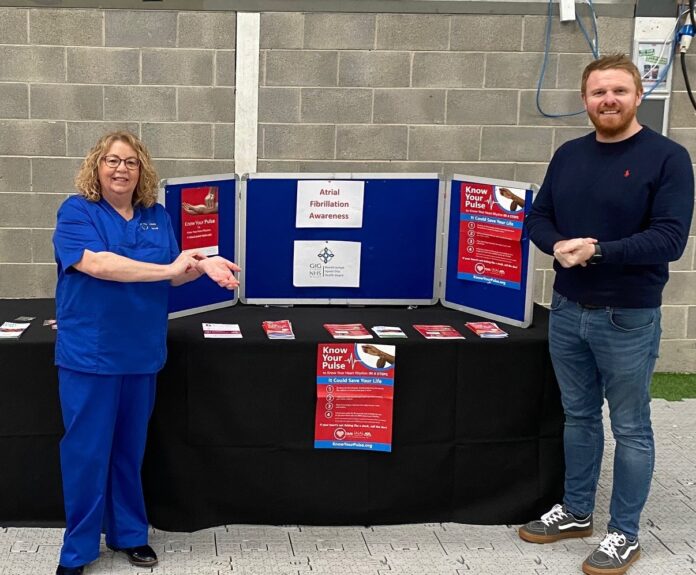

Atrial fibrillation or AF is a very common type of irregular heartbeat or arrhythmia which can affect adults of any age, but it is more common as we get older.
Although an estimated 1.5 million people have been diagnosed in the UK alone, experts estimate that at least 500,000 people remain undiagnosed. It is the most common heart rhythm disturbance encountered by doctors and healthcare professionals.
Hywel Dda University Health Board (UHB) is raising awareness of the condition for local people.
People should always see a healthcare professional for a diagnosis, but you can detect it yourself by feeling your pulse at your wrist. A normal heart rate is steady and usually between 60 and 100 beats a minute when you are resting.
If you have atrial fibrillation, your pulse will have no set pattern and the beats might have different strengths. Some people have atrial fibrillation which comes and goes. This means their pulse may feel normal at times and at other times it will be irregular.
Anyone with symptoms of atrial fibrillation should see a healthcare professional who will then arrange for an appropriate treatment to control the rate and rhythm of your heart. Mathew Banner, Cardiac Physiologist and Andrea Evans, Arrhythmia Specialist nurse at Hywel Dda University Health Board are working together to help to raise awareness about atrial fibrillation.
Mathew said: “Atrial fibrillation happens when the electrical impulses in a chamber of your heart known as your atria fire chaotically when they should be steady and regular, causing them to quiver or twitch.
“When this happens, you might feel an irregular and sometimes fast, heartbeat or pulse. Some people say it feels like their heart is fluttering or racing. These can come and go but sometimes, it does not go away at all. It is not life-threatening, but it is considered serious as it can create blood clots in the heart that may lead to a stroke.
“It is important that people know about atrial fibrillation and, importantly, how the simple pulse check can quickly and effectively identify a potential heart related problem. So, we encourage everyone to check your pulse and know your heart rhythm, it could save your life.”
Treatment and improving lifestyle choices is extremely important because untreated atrial fibrillation can increase the risk of stroke, heart failure and other heart related problems.
Mathew, continues: “We are at more risk of having atrial fibrillation if, we are of an older age, have a family history of atrial fibrillation, have high blood pressure, heart failure or cardiovascular disease, have diabetes, thyroid disorders, or drink too much alcohol.
“We can help reduce our risk by improving our lifestyle choices, such as cutting down on salt, fat, sugar, and caffeine, exercising regularly, and attending health check-ups.”
Symptoms of atrial fibrillation can include palpitations, chest pain, tiredness, dizziness or feeling faint, fainting or shortness of breath. Sometimes, people do not experience any symptoms and atrial fibrillation gets detected when having a clinical examination or check-up.
For more information visit: heartrhythmalliance.org/afa/wl/programs/know-your-pulse or contact their helpline: 01789 867502.
Help keep news FREE for our readers
Supporting your local community newspaper/online news outlet is crucial now more than ever. If you believe in independent journalism, then consider making a valuable contribution by making a one-time or monthly donation. We operate in rural areas where providing unbiased news can be challenging. Read More About Supporting The West Wales Chronicle






















